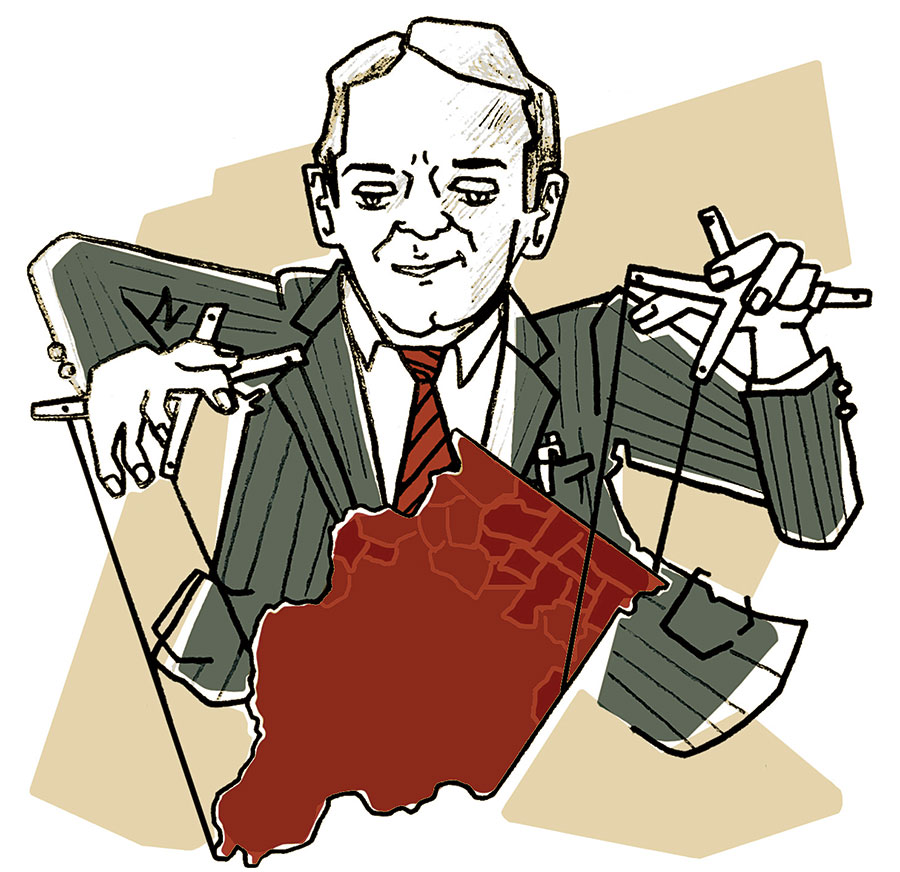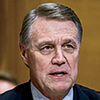
Check out the website of the Coalition to Stop the Proposed Tax Hike Amendment, the ponderously named PAC that helped defeat the so-called Fair Tax in November. It features videos of a single mother, small-business owners, and farmers testifying that a graduated-rate income tax would give “Springfield politicians” the power to raise taxes on “middle-income families” and retirees. Missing from the site is the name of the man who paid for it and for the TV ads the group aired incessantly during the World Series: Citadel CEO Ken Griffin. A billionaire 15 times over, Griffin is one of the wealthiest men in the state, and in the recent election he spent a small chunk of those riches — some $58 million — to fend off the Fair Tax and the retention of Illinois Supreme Court justice Thomas Kilbride, the linchpin of the court’s Democratic majority.
Griffin knows where to invest his money. For years, he had contributed to Republican politicians, including $22.5 million to former governor Bruce Rauner’s unsuccessful reelection campaign. But giving to the GOP in Democratic Illinois is like betting on a three-legged horse at the Kentucky Derby. So Griffin shifted his support to nonpartisan initiatives that would advance his conservative goals of low taxes, limits on public sector pensions, and reduced government spending. Of the $59.7 million raised by the coalition to fight the amendment, $53.8 million came from Griffin.
“Ken’s investment in the progressive tax campaign helped tell the truth about what Governor J.B. Pritzker’s tax would have meant for the middle class and small businesses,” says John Tillman, CEO of the pro-free-market Illinois Policy Institute. “He understood that the proposed tax hike amendment would’ve reduced jobs and opportunities for everyone.”
It was an investment that will be personally profitable for Griffin: Had the Fair Tax passed, the state would have imposed a 7.99 percent rate on individuals earning more than $750,001 and married couples bringing home more than $1 million. “His money absolutely helped” defeat the Fair Tax, says Chicago political consultant Thom Serafin. “Could they have won without the money? It would have been a close call.” Griffin also donated $4.5 million to Citizens for Judicial Fairness, the PAC that beat Kilbride, who was seen as an obstacle to the conservative project of reforming the state’s pension system.
Griffin made another very smart move: For the most part, he kept his name and his face out of the efforts. He wrote an anti–Fair Tax op-ed for the Tribune, but his TV ads were cast with jes’ folks Illinoisans, rather than a billionaire begging voters not to raise his taxes. One reason Rauner’s Turnaround Agenda failed was Rauner himself, who came off as an overbearing Uncle Moneybags. “Griffin never became a villain” in the Fair Tax campaign, because only political junkies were aware of his influence, says Kent Redfield, professor emeritus of political science at the University of Illinois Springfield.
His team is just as good at circling the wagons around him and preserving the story line that it was the people, not Griffin, who rallied to sink the tax. Lissa Druss, the coalition’s spokesperson, refuses to comment on Griffin’s contributions, saying the organization didn’t want to “spotlight” any individuals. Lance Trover, a former Rauner aide who was a consultant to the coalition, credits its success to “millions of small-business owners, retirees, family farmers, large employers, and middle-class families.” Jim Nowlan, head of Citizens for Judicial Fairness, says only, “I have never met nor talked with Griffin, though [I am] grateful for his generous support.”
Griffin’s two big wins have made him the de facto leader of the opposition in Illinois politics. His fortune is invaluable to the Republicans, regularly outraised by Democrats, who can draw on the bank accounts of labor unions and businesses wanting to put their money where the power is. Also, since the Democratic Party is led by billionaire Pritzker, the Republicans need a billionaire of their own to compete. Only Griffin could have matched the $56 million Pritzker personally contributed to support the Fair Tax.
Without a graduated income tax to raise revenue, Pritzker is now in the political bind of having to cut services, increase taxes on all Illinoisans, or both. That’s all part of Griffin’s long game to create an Illinois in which Republicans can win again, said former Chicago alderman Ameya Pawar, a Fair Tax supporter. Pawar compares Griffin’s clout in Illinois to the national influence of the Koch brothers, who funded political candidates and libertarian think tanks but generally shied away from running for office themselves. Griffin, who once told the Tribune that the super wealthy have “insufficient influence” on politics, would be tripped up by his tycoon image if he tried to challenge Pritzker himself for the governor’s office, but he could stake a more appealing personality to do it for him.
“What Ken Griffin and Bruce Rauner realized is that when you put a rich guy on the face of busting pensions, it’s harder to pull off, but if you’re willing to fund a shadow campaign, it can work,” Pawar said. “I think Ken Griffin’s strategy is to weaken Governor Pritzker, and then try to find someone, a Republican like [U.S. Representative] Adam Kinzinger, and run that kind of Rauner-esque campaign without the personality of Rauner.” If he does, don’t expect to see Griffin campaigning for his candidate. As usual, he’ll let his money do the talking.
Griffin, FTW
Ken Griffin spread the love — and the cash — abundantly in 2020, donating to Republican candidates and super PACs across the United States. Here’s a scorecard of how his top three beneficiaries outside Illinois fared on November 3.

1820 PAC
Griff bucks:$1.5 million
Result:Win. This super PAC supported four-term Republican senator Susan Collins of Maine, who trailed in the polls against Democrat Sara Gideon but ended up winning by eight points.

Georgia Action Fund
Griff bucks:$1 million
Result:Mixed. This super PAC specifically funded attacks against Joe Biden and Democratic Senate candidate Jon Ossoff. Both races ended in nail biters, with Biden pulling off the win but Ossoff headed to a runoff January 5 against Republican incumbent David Perdue, who holds a slight edge.

Priorities for Iowa Political Fund
Griff bucks:$750,000
Result:Win. Contributions to Republican candidates Randy Feenstra for Congress and incumbent senator Joni Ernst helped both hold off unexpectedly competitive Democratic candidates, who received a deluge of donations.




Comments are closed.